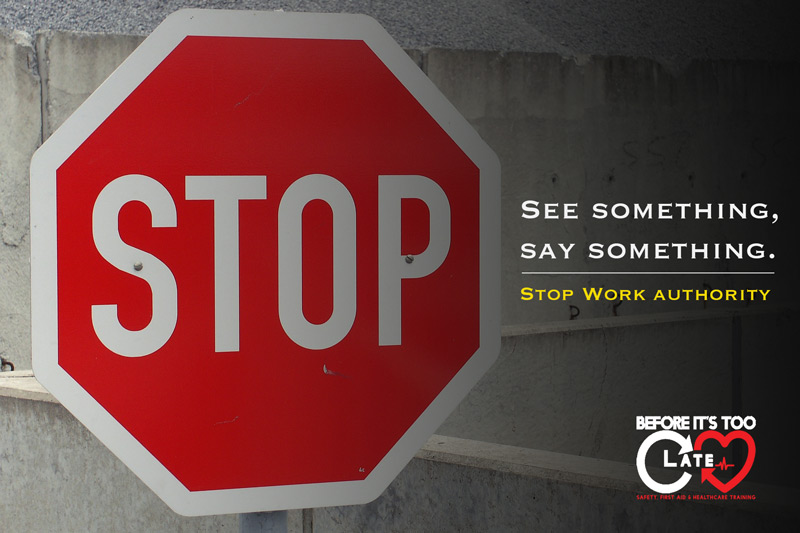Stop Work Authority
When performing work, it is important that an employee feels empowered and is knowledgeable that he/she has the authority to stop work if an unsafe hazard is evident that prohibits the employee from conducting a task. Stopping work is, at times, a sensitive power depending on the industry. There are employees that are fearful to use this power. The lack of confidence that employees have to exercise this right can escalate a situation and make a situation worse than it needs to be.
Reasons Why Employees Hesitate to Use Stop Work Authority:
- Fear of punishment from supervisor
- Fear of conflict with other employees
- Does not want to be labeled as a “snitch” or “soft worker”
- Fear of losing job
- Does not want to slow project or work down
Clearly, many of the reasons why employees hesitate to exercise stop work authority revolve around fear of losing something. One recommendation to feel more confident about using stop work authority is to review all hazards associated with your job and position with your Human Resources manager and explain any grey areas that might exist.
Despite what many employers and groups express or claim, stop work authority is not just a privilege, it is a responsibility. Your job as a safe employee is to be the first set of eyes and voice while on the clock. At the end of the day, stopping work can keep you, your coworkers, and your company safe.
“But Sam, it’s not that simple. I tried stopping work and my boss yelled at me and threatened to fire me.”
Unfortunately, some managers care more about how quickly a job gets completed than the safety of their workers. Many of these managers feel threatened or fearful that if one of their employees stops work, the higher ups in that company may think the manager does not have control over their group. This is not the case though! Your choice and ability to identify a risk or potential hazard can save a lot of harm, if conducted correctly.
Stop Work Abuse
As mentioned earlier, stop work authority is a power that comes with great responsibility. Many employers and managers have fears that employees may tend to abuse this power to get out of work. Because of this, it is important that safety talks be conducted prior to beginning a job or task to make sure all parties are aware of the potential hazards. Abuse of stop work authority can lead to reprehension and loss of job security. Be honest, be safe, and if you see something, say it.
How to Stop Work
If you see a potential hazard, risk or unsafe action, your job is to contact your direct supervisor or safety representative immediately. Also, alert any co-workers or employees that are assigned to the specific task as well. At that point, the manager or safety representative will analyze the issue and take corrective actions in order to resolve the issue.
Final Thoughts
All things considered, stop work is a crucial responsibility that employees should feel comfortable exercising. If there is a potential safety hazard that could cause an accident, the issue should be made known. Knowing the steps for how to stop work and who to approach is the first step of using this responsibility to create a safer work environment. If you have issues or fear of using such authority, contact your supervisor directly and your Human Resources team to make you feel comfortable in the workplace.
Did this article help? We hope this toolbox talk was informative, helpful and easy to relate to. Please visit safetytalkideas.com and B42L.com to learn more about safety talks and topics.






Had a supervisor tell us to do something different than we were trained to do and we called stop work and didn’t want to hear it saying we didn’t know the process when this was they way we were trained and it is the most dangerous thing we do and we told higher authority but seems they are pushing it under the rug